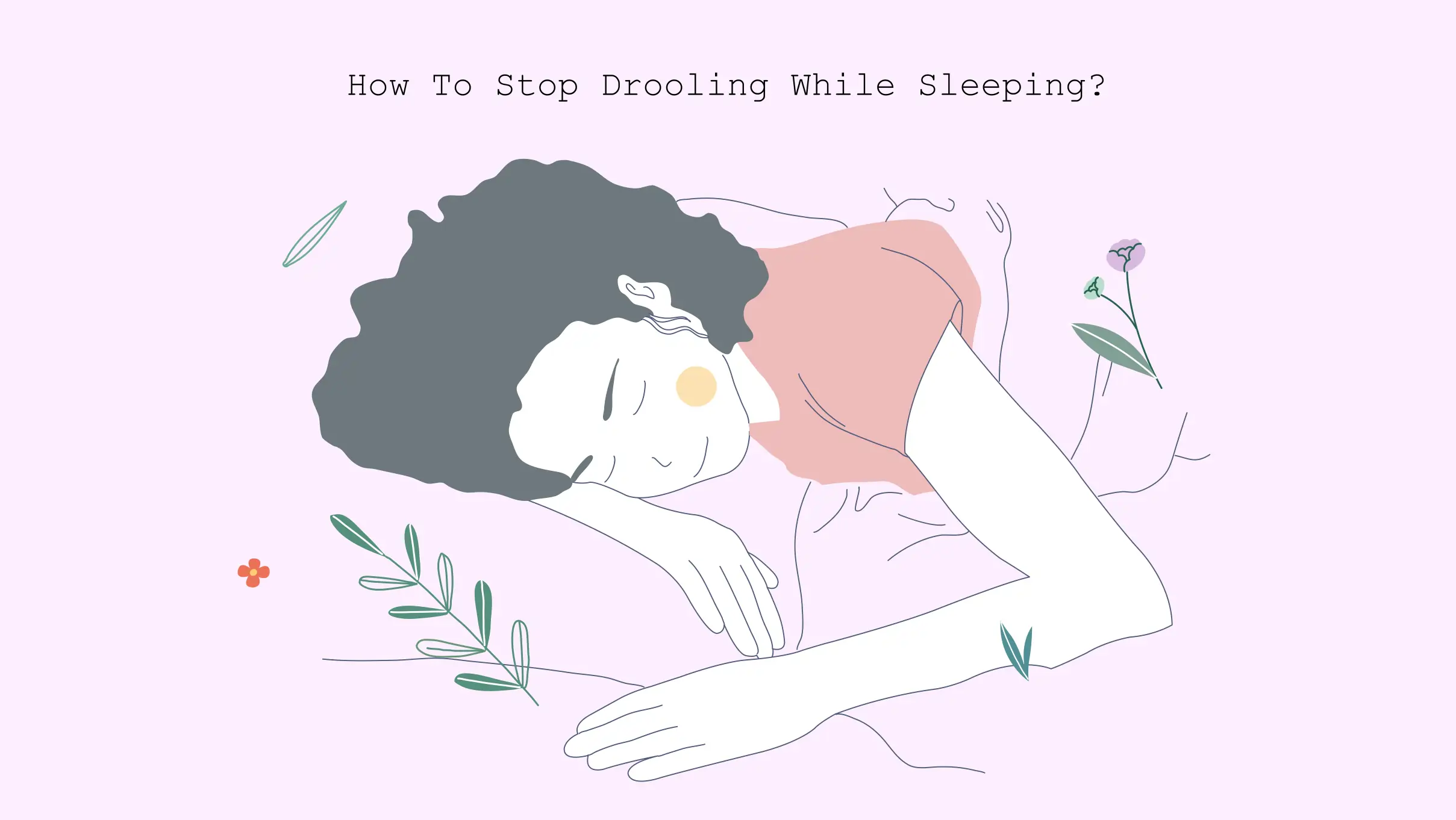Drooling In Your Sleep: What Causes It and How to Stop
Written by


Waking up with a wet spot on the pillow and face each day is quite upsetting. It is such a bad start to the day! Changing multiple pillow covers seems an arduous task on each week’s to-do list. Frequently waking up to spit excessive saliva can also disrupt quality sleep. Moreover, attending overnight hangouts with friends gets restricted due to the drooling problem. Is there any way out of this embarrassing situation?
Well, yes, we have got your drooling problem covered. In this article, we will first explain the causes that can be the reason for your excess saliva in the mouth. Later you will get to know how to stop drooling while sleeping. But before that, let us see whether drooling during sleep is normal or not.
Is Drooling During Sleep Normal
Drooling is an excessive saliva flow from the mouth of a person. Saliva production varies daily per the circadian rhythm. The saliva production is more during the day while performing exercises and less at night. It helps to keep the mouth and throat lubricated.
You might be wondering, is drooling a sign of good sleep? Well, during deep sleep, it is considered normal. It can be a symptom of some underlying disease in extreme drooling cases. Thus, consulting a physician will be beneficial to mitigate the excess slobber production.
What Causes Drooling While Sleeping
To know how to stop drooling while sleeping, you must know what causes you to drool. So let’s understand the causes before you try to prevent drooling while sleeping.
Your Sleeping Position
Your sleeping position affects the saliva spitting during the night as you sleep. Back sleeping causes the saliva to go back into the throat due to the gravitational force. However, if you are a side or a stomach sleeper, gravity will pull out the saliva, making it flow out of the mouth through your lip’s corner. Most people sleeping with an open mouth too suffer from salivating problems. To reduce the drooling pain, sleeping on your back will be helpful.
Infections and Allergies
Most people have dripping saliva problems due to infections and allergies. Sinus infections and seasonal allergies are known to cause breathing problems. A person tends to breathe from the mouth, which causes the accumulated saliva to overflow. Conditions such as tonsillitis and mononucleosis also cause drooling issues. Thus, to mitigate the drooling trouble, the root cause of breathing problems needs to be treated.
Gastroesophageal Reflux Disease
Do you feel dirty and sad to see wet spots on your pillows and wonder, “why do I drool in my sleep?” One of the reasons can be gastroesophageal reflux disease, a digestive health condition. Oesophagus, the tube which passes the food substances from the throat to the stomach, is damaged. Thus, the food substances are sent back into the oesophagus instead of going into the stomach, causing difficulty swallowing. This condition is known as dysphagia. A person suffering from dysphagia feels something is stuck in their throat, and thus consuming becomes difficult. So, the unswallowed saliva leads to drooling.
Obstructive Sleep Apnea
A person suffering from obstructive sleep apnea experiences an interrupted breathing process during sleep. Due to frequent stopping of breathing, the upper airway gets blocked. Thus, the soft tissue in the throat collapses, putting pressure on the diaphragm and chest muscles. The pressure makes them work hard to open the airway. Due to this, the person breathes through the mouth leading to drooling problems. However, a person can suffer from a dry throat due to mouth breathing.
In nose breathing, mucus and hairs from the nasal cavity humidify the air by trapping the dirt particles before passing the air to the lungs. Whereas in mouth breathing, the air goes directly into the lungs. The unfiltered air can damage the lungs with infection. Moreover, the air dries up the saliva. Thus, sometimes you feel a lack of saliva after waking up with a dry throat.
Following are the obstructive sleep apnea symptoms
- Daytime sleepiness
- Loud snoring
- Dry mouth
- High blood pressure
- Decreased libido
Bruxism
Bruxism is an excessive grinding of teeth, a sign of temporomandibular joint syndrome. In this condition, the teeth are rubbed against each other, making the jaw move side to side or back and forth. Thus, the breathing process is interrupted by blocking the airway. A blocked airway makes the person breathe from the mouth, keeping it wide open while sleeping. Therefore, bruxism can cause slobbering issues.
Symptoms of bruxism are as follows:
- Teeth grinding
- Fractured or chipped teeth
- Worn tooth enamel
- Increased tooth pain
- Tight jaw muscles
- Sleep disruption
Medication Side Effects
Certain antipsychotic medicines, such as clozapine and olanzapine, cause drooling problems in slumber. If you are undergoing any treatment, you might suffer from excessive saliva flow from the mouth. In that case, you must check your medicine’s side effects. Therefore, it is advised to consult the doctor and seek an alternative to the previous medication.
Underlying Medical Conditions
Salivating problems can also be due to neurologic disorders such as Parkinson’s disease and cerebral palsy. The person experiences pain while swallowing. Due to this, the excess saliva goes back into the mouth while sleeping. Stroke is another disorder where the blood fails to reach the brain due to the formation of blood clots. When left untreated, it affects the nervous system leading to swallowing problems.
How to Stop Drooling in Your Sleep
You now know the causes of excess saliva problems in the mouth. So let’s now learn how to stop drooling in your sleep.
Change Sleeping Positions
To control drooling while you sleep, do check your sleeping position. If you are a side or stomach sleeper, try changing your sleep position. By switching to a back sleep position, your excessive saliva flow will get controlled and prevent it from messing up your clothes and pillows during the night.
Initially, you might find breathing difficult while sleeping in a new position. Try sleeping on a comfortable mattress to support your spine to reduce drooling. Additionally, you can place a pillow below your knees for a few days to get accustomed to the new resting position.
Treat Allergies
Allergies cause the body to produce more saliva to flush out toxins. Thus, a person suffers from excessive saliva accumulation in the mouth. Itchy eyes, runny nose, and sneezing are some of the seasonal allergy symptoms. The most common symptoms are mould and pollen. In sinus congestion, inflammation blocks the nose leading to breathing problems. Due to this, the person tends to do mouth breathing. The excess saliva then flows out of the mouth through the lip’s corner.
Apart from this condition, sore throat causes swallowing problems due to bacterial infection. There are red and white patches observed in the throat and swollen glands. Thus, less swallowing causes the saliva to overflow through the mouth. Instead of just wondering how to stop salivating, visit an ENT specialist consultant for the proper treatment.
Consider Botox Injections
Bruxism and sialorrhea are neurological disorders that can cause drooling problems. Bruxism means teeth grinding, and sialorrhea means excessive salivation. Botox can effectively treat both conditions. Though Botox is not an FDA-approved treatment, it can cure both diseases. The affected muscles, which cause teeth grinding and saliva production, are injected in the Botox treatment process. However, some side effects of Botox treatment, such as ‘drooping smile, also known as Bell’s palsy, need to be considered.
Wear a Mandibular Device
A mandibular device is to be worn in your mouth while dozing. If you are wondering how to stop too much saliva in mouth, using this device would be beneficial. The jaw is moved forward, and the airways expand with mandibular devices. Expanded airways make the breathing process effortless. Moreover, it helps your lips to remain closed by keeping your tongue and teeth in a proper position.
Try Speech Therapy
After a proper diagnosis, a physician can recommend speech therapy if needed. Jaw stability improves with this therapy. Moreover, tongue strength and mobility are enhanced. Lip-closure exercises are taught in speech therapy to improve the swallowing process. This therapy demands sufficient time to show results. Nonetheless, the patient experiences a reduction in drooling problems.
Ask About Medications
Medications to prevent drooling are suggested for neurological health conditions. They help block nerve impulses before they reach the salivary glands. Thus, ask your doctor about medications to reduce your drooling problem.
Ask About Surgery
Doctors recommend surgery in severe hypersalivation cases. A few types of surgery for drooling treatment include removing salivary glands, altering salivary gland ducts, and reducing nerve connections to salivary glands. Surgery is considered the last option when everything else has failed.
Manage Your Stress
Though stress is inevitable in today’s lifestyle, managing it becomes the most important. Stress and anxiety affect the unstimulated saliva flow rate in adults. To manage stress, you can try meditation and yoga breathing techniques.
When to See A Doctor
Drooling is considered normal when you are in a deep sleep. However, you need to see a doctor for a severe drooling problem. After thorough analysis, a doctor can recognize the underlying medical condition and guide you toward appropriate treatment. Seeing a doctor and following their suggestions will benefit the long run.
Conclusion
Drooling can be a symptom of many underlying medical conditions. The symptoms can vary from person to person. Thus, knowing the real cause of your excessive saliva formation in the mouth is vital. Once you know the root cause, you can go for appropriate treatment. Most important is managing your stress and taking charge of your health to mitigate any health problem.
FAQs
Why do I drool in my sleep so much?
Drooling while sleeping is pretty common, it can also be a sign of wrong sleeping position, or certain medical conditions, including neurological disorders and sleep disorders.
What is drooling a symptom of?
In the first two years of life, drooling is common because babies still don’t have complete control over the muscles around their mouths. As a result, people frequently snore while they are asleep. Drooling can sometimes signify illnesses or neurological disorders.
Is drooling a symptom of Parkinson’s?
Sialorrhea, or excessive drooling, is a standard Parkinson’s Disease symptom that can make people uncomfortable in social settings.
people like this article
Written by








